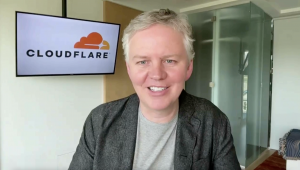Breaking Analysis: HP Shareholder Fireworks – Former Autonomy CEO Mike Lynch Sends Another Open Letter
Last fall, Hewlett-Packard surprised the world when it told Wall Street that it was posting a $8 .8 billion write off charge from the overpriced Autonomy deal. SiliconANGLE was the first to report the accounting issue, which quickly became a huge firestorm. Now Autonomy drama is back, with former CEO Mike Lynch sending another open letter to HP, and the world.
![]()
HP was very aggressive in it’s positioning: the deal was overpriced and that Mike Lynch and team was in the center of what was called “accounting irregularities” at Autonomy.
Now, on the day of HP’s annual shareholders meeting in Silicon Valley, the PC maker will take the heat from the fallout of the Autonomy acquisition. The board will come under fire. Fueling the flames, Mike Lynch has sent an open letter to HP and the world, reiterating his innocence and demanding evidence.
According to reports, Ray Lane and Marc Andreeseen are expected to survive, but the others might be gone.
HP is doing well in its turn around under Meg Whitman. Industry expert and Wikibon analyst Dave Vellante told me that the HP Summit was a big success. Vellante went on to say that HP is fired up, and doing well.
According to my sources in the industry, HP would not be in good operating shape if it make sweeping board changes now. Maybe it might swap one or two members, but to radically alter the board will impede the positive momentum in HP and Meg Whitman’s turnaround plan.
HP has been getting positive feedback on staying the course by not spinning out its personal systems group, which will be poised to lead the latest Android hardware product lines. Dave Vellante of Wikibon and other analysts agree that HP will have a supply chain advantage in getting back in the smartphone game.
In the meantime, the fireworks continue and Mike Lynch continues his PR assault on HP. Below is his open letter in its entirety. My analysis follows.
Open Letter From Mike Lynch to HP
.
By Mike Lynch, former CEO of Autonomy
Today HP will hold its annual shareholder meeting. This meeting provides a moment of accountability for HP’s Board of Directors to all its stakeholders, and is an appropriate time for the Board to address material questions.
A significant issue for HP’s stakeholders is the allegations HP has made against the former management team of Autonomy in relation to the acquisition of that company, and the related impairment charge of $8.8 billion taken against shareholder funds. As a member of the former management team of Autonomy I have a shared interest with the shareholders of HP (of which I am not one) in getting to the bottom of those allegations, understanding exactly what happened within HP related to this situation and resolving it as soon as possible.
We therefore put forward some questions that we believe HP’s Board of Directors needs to answer at the shareholder meeting:
1. Can the Board provide details and evidence of the allegations it has made against the former management team of Autonomy to shareholders and to the people it has accused, so that everyone can understand the allegations that are being made and how it relates to the decisions and statements the Board has made? Can the Board confirm when it first became aware of these specific allegations? Will the Board provide the report from PwC on which its allegations are based to the former Autonomy management team so that this issue can move toward resolution? Will the Board also make available the conclusions of the findings of the recently appointed committee investigating the circumstances of the acquisition?
2. How did HP calculate the impairment charge it has taken against Autonomy? Several qualified commentators, including a former Chief Accountant of the SEC, have questioned how the alleged irregularities in Autonomy’s accounting could generate such a large write-down. How much of the impairment charge was related to the operating performance of Autonomy post-acquisition?
3. Did HP approach the UK Takeover Panel at any stage in an attempt to rescind its offer to buy Autonomy before completion? If so what was the reason it gave and why was this material change of view not communicated to shareholders?
4. The former management of Autonomy began alerting Ms Whitman as early as December 2011 to significant problems with the integration of Autonomy into HP that were negatively impacting its performance. When did Ms Whitman acknowledge that Autonomy was not performing against expectations? Why was this not communicated to shareholders at that time?
5. Will HP commit to behaving in a transparent manner in providing information about these allegations and the legal processes that have been set in motion? This includes not pre-empting announcements by regulatory authorities and not waiting long periods to disclose information.
We continue to reject the allegations made against us by HP and believe it is in the interests of all parties that these questions be addressed directly by the Board so this issue can be resolved as swiftly as possible. HP has acted in an aggressive and unusual manner throughout this episode, making highly damaging public accusations without providing any supporting evidence, either to the public or to the people they have accused.
As we have said before, we believe the problem with the Autonomy acquisition by HP lies in the mismanagement of that business by HP under its ownership, making it impossible for Autonomy to deliver on HP’s expectations. Autonomy’s accounts were fully audited by Deloitte throughout the period in question and Deloitte has confirmed that it conducted its audit work in full compliance with regulation and professional standards. We refuse to be a scapegoat for HP’s own failings.
Past Present and Future – HP Turnaround Is Working
.
In 2011 I was the only person raising a red flag on Autonomy and the value the PC business can bring. Here is that post, and my open letter to Meg and her team. The advice was simple: 1) Fix Autonomy, 2) Get Cloud Right, 3) Keep the PC Business (don’t spin it out).
![]() Meg Whitman took my advice and is doing all three things to stop the bleeding at HP. Fixing Autonomy – check; Getting Cloud Right – check; Keeping the PC Business (making a phone) – check.
Meg Whitman took my advice and is doing all three things to stop the bleeding at HP. Fixing Autonomy – check; Getting Cloud Right – check; Keeping the PC Business (making a phone) – check.
Going forward, HP outlined its plan at the recent analyst meeting. SiliconANGLE and Wikibon were on the ground there in Boston for HP’s briefing to top analysts.
Here’s the recap and report from HP Analyst Summit.
At Hewlett-Packard’s recent analyst gathering in Boston, the company’s top brass shared their plan to get the technology vendor back on the saddle. Wikibon co-founder Dave Vellante was among the insiders who got an invite to the meeting.
Vellante discussed his observations from the event with Kristin Feledy on this our morning new program – NewsDesk – see NewsDesk segment (full video below).
The first thing that stood out for him was that HP CEO Meg Whitman and a substantial portion of her executive team attended the event. The chief executive took to the stage with a lengthy keynote address, in which she communicated her vision for HP.
Vellante says that Whitman’s message resonated with the audience, unlike the one former CEO Leo Apotheker delivered at the company’s previous analyst gathering in 2011. She refuted rumors that HP is splitting up, detailed her efforts to reorganize the company, and promised that the vendor will be back on track within five years.
Vellante is optimistic. He notes that HP’s stock rose by 50 percent in the past few months alone, and Vellante further explains why he thinks Whitman will reach her goals in less than five years:
“I think that the prospects for turnaround are very very good for the following reasons: One: HP’s customers do want it to win, it has a very loyal customer base and HP does a good job servicing customers. HP throws off cash which is critical in this case as it’s burdened by $20B in long term debt it needs to service and pay down. Now it’s saddled by some debt, it’s got over $20 billion in long term debt it gotta pay that down. Whitman made clear during a short discussion with her, ” the top priority is to pay down that debt, more critical than stock buybacks or potential acquisitions.”
Another thing Vellante found notable was that HP’s executives were very forthcoming about Autonomy. The company recognized it overpaid and, more surprisingly, actually managed to turn the UK-based analytics firm into a genuine asset. Vellante’s final thought was his view that HP’s future success will hinge on its software investments.
See Vellante’s full analysis below:
A message from John Furrier, co-founder of SiliconANGLE:
Your vote of support is important to us and it helps us keep the content FREE.
One click below supports our mission to provide free, deep, and relevant content.
Join our community on YouTube
Join the community that includes more than 15,000 #CubeAlumni experts, including Amazon.com CEO Andy Jassy, Dell Technologies founder and CEO Michael Dell, Intel CEO Pat Gelsinger, and many more luminaries and experts.
THANK YOU





















